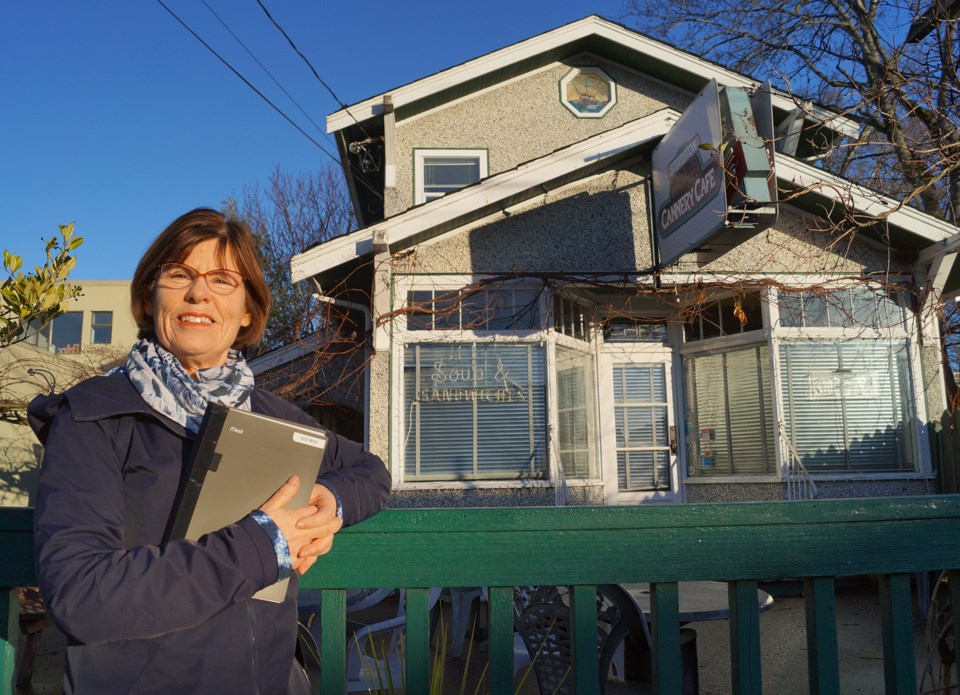The sale and subsequent closure of the Cannery Café on Moncton Street, in the heart of Steveston Village, has a past president of the Richmond Heritage Commission renewing the call for more definitive measures of protection for historic sites.
Stevestonite Kathleen Beaumont, a former planner at the University of B.C., recalls many memories of sitting in the café or simply walking by and admiring the early 1900s cannery cookhouse, that still features a classic gabled roof, wood frame windows, pebble dash siding and a large picket-fenced patio for gatherings.
“For many of us, the café represented one of those places where you could go for coffee and meet friends,” said Beaumont.
The building is listed in a 2009 city study — the Steveston Village Conservation Strategy — as one that has adapted over time and thus is “an important reflection of the continued evolution of the village.”
Beaumont said there are rumours the café will be turned into a Chinese restaurant or a daycare and isn’t sure what the sale to an offshore owner means for the future of the building.
Part of the problem of not knowing is what Beaumont describes as an ad-hoc, outdated vision for the village.
Heritage, said Beaumont, provides communities with a sense of place and puts progress in perspective. And she’s concerned new developments will “max out” and ruin valued open spaces where community interactions take place. In Steveston, older buildings provide for a unique tourism experience, she added.
“Very little in the village is actually protected from demolition” and Steveston “may be in for some surprises,” said Beaumont, looking eastward toward a large building recently erected on Bayview Street.
The vast majority of village buildings listed in the strategy are not “designated” as heritage.
Meanwhile, the city’s Steveston-specific design guidelines (Sakamoto guidelines) are more than 25 years old and open to interpretations by developers, said Beaumont.
The city also has a 2005 heritage inventory, which it plans to update with $150,000 in new funding approved by Richmond city council (Coun. Carol Day objected) on Monday. However, the old inventory also did nothing to protect heritage buildings and sites, case in point six Japanese gardens on Moncton that were recently bulldozed for a micro house development.
“There are a lot of buildings on the inventory that are heritage buildings but they’re not designated as such and that means anyone can come along and rip them down. And even if it was a designated building, Richmond has never put any real money on the table to try and help with heritage preservation. It’s incumbent on the person who buys the building to keep the look and feel,” explained Beaumont.
Because the Cannery Café building is listed in the conservation strategy, council must approve any alterations or demolitions.
“If anything, it will be the strength of the conservation strategy that saves this building,” said Beamont.
However, Beaumont said she left the heritage commission, claiming the city paid it lip service.
“There was no real sense in working with — or really giving some recognition to the fact these are — the people who are the most concerned,” said Beamont, adding that the idea of forming a heritage foundation would be a good idea if the culture at city hall was less dictatorial.
She noted there are some instances of “reasonable” development, such as the new building at the southeast corner of No. 1 Road and Moncton.
Otherwise, much is left up to developers, or in some cases, council, which, according to Beamont, hasn’t always worked out, pointing to an English garden next to the Steveston Museum that has recently been ripped up after council approval.
“We had a beautiful garden here with a rich history. Why do we need another Japanese garden? We already have Japanese gardens.
“This was barrelled through by council and now the trees are gone,” said Beamont.



